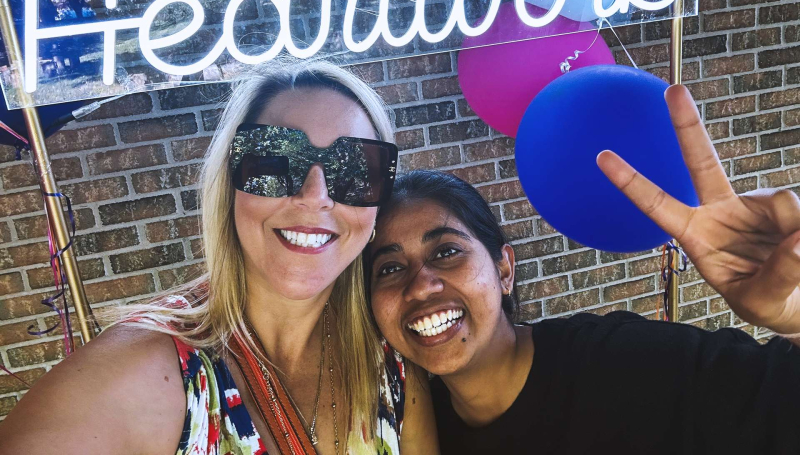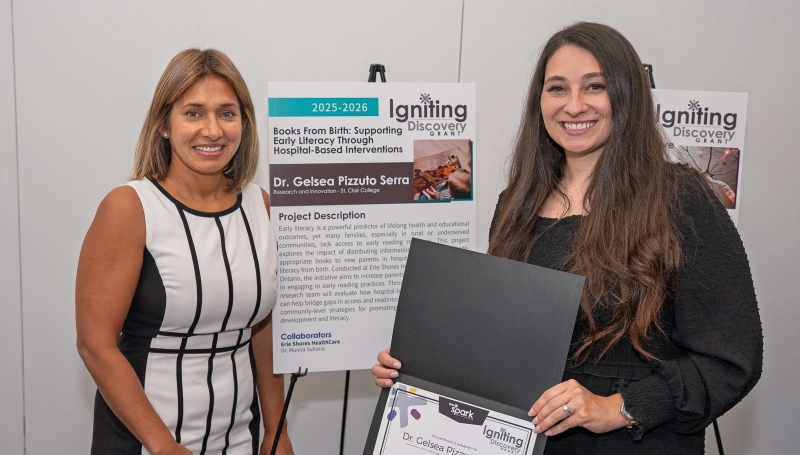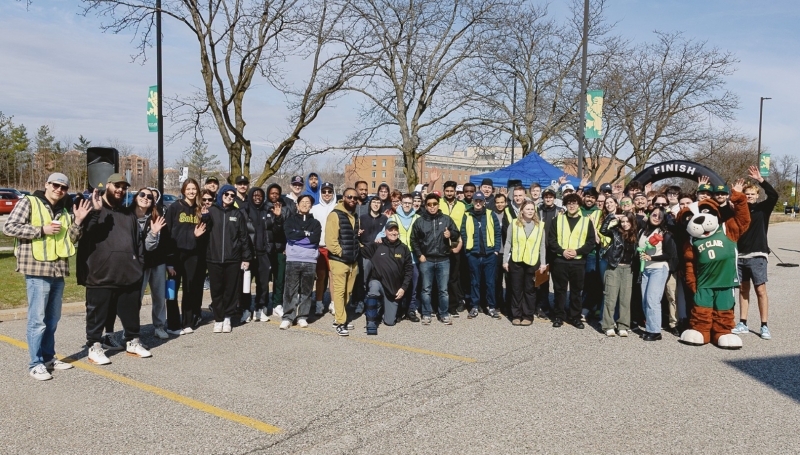Program Overview
Graduates of this program can be part of the licensed child care team supporting young children in infant, toddler, preschool or school age classrooms in developing thinking, learning, communication, physical, social and emotional skills. Registered Early Childhood Educators design and provide a curriculum that is based on the interests and the developmental level of each child. Practitioners in the field of Early Childhood Education work closely not only with children but also with families and other professionals, so excellent communication and social interaction skills are also required.
Program Highlights
- Placements can be completed in a variety of places and locations. Placements within a variety of settings such as Francophone or Indigenous settings and also extended hours settings.
- Graduates are able to apply for certification to the Association for Early Childhood Education Ontario.
- Graduates must register with the College of Early Childhood Educators to practice in the profession.
- Registered ECE professionals design and provide a curriculum that is based on the interests and development level of each child.
Career Opportunities
Positions are available in community-based child care; EarlyON Child and Family Centres, and in-home care. There are also positions available with Boards of Education as Educational Support staff or Registered Early Childhood Educators in Kindergarten classes.
Transfer Agreement
ECE graduates are eligible to participate in a transfer agreement between the University of Windsor (Bachelor of Arts (Disability Studies) or Bachelor of Social Work). Graduates are also eligible to participate in a transfer agreement with St. Clair College's Developmental Services Worker (DSW) program and take an "accelerated" one-year program to earn their DSW diploma.
Contact the Program Coordinator for details.
Admission Requirements
OSSD with the majority of courses at the College (C), University (U), University/College (M) or Open (O) level plus:
- Grade 12 English - ENG4U, ENG4C, EAE4C or EAE4U.
Mature students - See Admission Procedures for details.
Important Information
This is a HIGH-INTEREST program and has the potential to become oversubscribed. Applicants are advised to apply before February 1st. See Admission Procedures for details.
Courses
Please scroll to the bottom of the list to review the Pre/Co-Requisites.
The curriculum below is for incoming students:
Semester 1
| Code |
Title |
Credits |
|
ECE134
|
Curriculum and Pedagogy I
|
3
|
|
ECE137
|
Foundations Of Early Learning And Care
|
3
|
|
ECE138
|
Observation And Documentation
|
3
|
|
ECE139
|
Building Responsive Relationships
|
3
|
Semester 2
| Code |
Title |
Credits |
|
ECE221
|
Curriculum And Pedagogy II
|
3
|
|
ECE234
|
Field Placement Seminar I
|
1
|
|
FAW100
|
Foundations Academic Writing I
|
3
|
Semester 3
| Code |
Title |
Credits |
|
ECE325
|
Field Placement Seminar II
|
1
|
|
ECE322
|
Child Development III
|
3
|
|
ECE319
|
Community and Families
|
2
|
Semester 4
| Code |
Title |
Credits |
|
ECE424
|
Field Placement Seminar III
|
1
|
|
ECE422
|
Issues And Leadership
|
2
|
|
ECE205G
|
Anti-Oppression In Canadian Society
|
3
|
View Pre/Co-Requisites for Early Childhood Education
Every effort has been made to align the pre/co-requisite document with the information on the course outline. However, if there are any discrepancies identified, the information on the course outline takes precedence.
Pre-Placement Requirements

St. Clair College has partnered with Synergy Gateway Inc to provide you access to Verified - a platform that is used by students at other post-secondary institutions across Ontario for the purpose of digitally collecting placement requirements related to placement(s). Synergy Gateway Inc will provide support and clearance to help with your required documentation. You will be required to complete an Electronic Requirements Verification (ERV) Review through the Verified platform in order to receive clearance to begin your clinical placement. You will be provided access to "Verified" via a secure username and password. You will use Verified to:
- Upload your pre-placement requirements documentation for review.
- Book your Electronic Requirements Verification (ERV) service (this is a service that reviews the documents you have uploaded and provides you a status as to your eligibility to begin placements).
- Track your ongoing requirements compliance.
Each student will receive log-in credentials to access Verified that will be sent to your St. Clair College email account. Please check your inbox, spam and junk mail folders for an email from the "Synergy Help Desk". You will be required to create a new password upon logging in. Be sure to view the video user guides and student guidebook to learn how to use the Verified platform.
Any associated fees for Synergy Gateway Inc to complete the pre-placement requirements are the sole responsibility of the students:
- Synergy Review Fee: $50.50 + tax
- Synergy Follow-Up Review Fee: $10.00 + tax
It is mandatory that students complete their ERV service through Verified to be eligible for your upcoming clinical placement.
Once your account has been set up with Verified, inquiries can be directed to Synergy Gateway Inc at www.Synergyhelps.com. You will need to submit a Help Desk ticket. Their Help Desk hours are Monday to Friday: 10 am - 3 pm, excluding holidays.
** Please note: If you are an International student completing a placement, you will require a valid COOP Work Permit.
Requirements
(Please refer to your Synergy communications for full details)
Disclaimer: Vulnerable Sector Police Clearance Requirement
Please be advised that completing your Vulnerable Sector Police Clearance (VSPC) as early as possible is strongly recommended. Due to ongoing processing delays at police services, clearance results are taking significantly longer than expected to be issued.
Your placement cannot begin without a valid and completed VSPC on file. We are not responsible for any delays in placement start dates due to incomplete or pending police clearances.
To avoid disruption or deferral of your placement, prioritize submitting your police clearance application immediately.
Thank you for your attention to this important requirement.
- Additional Attestations will be required through Synergy Gateway
This is to make you aware that, although a COVID-19 vaccination is not required to attend St. Clair College, most of our placement sites require students to be fully vaccinated for COVID-19 to be eligible to attend. Students who are not fully vaccinated cannot be provided with a placement for their program and, therefore, will not be able to complete their programs. Please be advised that COVID-19 booster shots and/or other requirements may become mandatory for placement, however, they are not currently required.
- Student placements are assigned at the discretion of the program.
- Students may be required to obtain further clearances for placement at the discretion of the placement site.
- Student personal requests for placement cannot be accommodated.
- Placements may be outside the Windsor/Chatham area (& could possibly expand throughout the province)
- Students are responsible for their own accommodation.
- Students are responsible for their own travel and all costs of placements.
- Students are responsible for the cost of scrub uniforms/footwear and equipment (such as a stethoscope, a watch with a second hand) and other incidentals as required.
- Placement schedules may include shifts on days, afternoons, weekends and holidays throughout the program based on placement needs and agency availability.
Your Investment
The standard tuition and compulsory fees for the current academic year:
2025-2026 Tuition Fees
For programs with Experiential Learning (Work Placement/Internship): Costs for accommodation, if needed, travel and related expenses are at the student's own expense. It is recommended for most programs that students have access to a laptop or desktop computer while away from home during experiential learning periods.
Textbooks and other materials are in addition to Tuition Fees. Textbook prices may be found on the Bookstore website.
Tuition and Payment Info Campus Bookstore
Please be aware that tuition and compulsory fees are subject to adjustment each year. The College reserves the right to change, amend or alter fees as necessary without notice or prejudice.
Program Physical Demands Analysis
Program Vocational Learning Outcomes
Early Childhood Education (Ontario College Diploma) (MTCU Code 51211)
The graduate has reliably demonstrated the ability to:
- Create learning contexts to enable, build and maintain caring, responsive relationships* in partnerships with children*, families* and communities that value and respect social, cultural and linguistic diversity* including Indigenous* peoples’ worldviews and Francophone identity.
- Co-create, facilitate and reflect upon inquiry and play-based* early years and child care* programs and pedagogical* approaches to support children’s* learning, holistic development* and well-being following children’s* capabilities, interests, ideas and experiences.
- Co-design and maintain inclusive* early learning environments* to value and support equitable, accessible and meaningful learning opportunities for all children*, their families* and communities in a range of early years and child care* settings.
- Collaborate with children*, families*, colleagues, agencies and community partners to create, maintain, evaluate and promote safe and healthy early learning environments* to support independence, reasonable risk-taking and healthy development and well-being.
- Use observation strategies* to identify children’s* strengths and challenges and to ascertain when children* and families* might benefit from additional support or community resources.
- Use professional communication in interactions with children*, families*, colleagues, employers, the regulatory body*, government authorities and children’s* service agencies to meet legal and ethical standards of the early years sector*.
- Act in accordance with relevant legislation, regulations, College of Early Childhood Educators Code of Ethics and Standards of Practice, agency policies and procedures and principles of evidence-informed practice* and reflect* upon their impact on one’s own role in early years and child care* settings.
- Identify, report and document when a child is in a situation of perceived risk for, or actual neglect or abuse, in accordance with legislation, the College of Early Childhood Educators Code of Ethics and Standards of Practice, policies and procedures.
- Create and engage in partnerships with families*, communities, colleagues, interdisciplinary professionals, authorities and child service agencies to advocate for quality early years and child care* programs and services.
- Engage in reflective practice* and continuous professional learning* in accordance with principles of lifelong learning, evidence-informed practices* in the early years sector* and requirements of the College of Early Childhood Educators.
Additional Information






